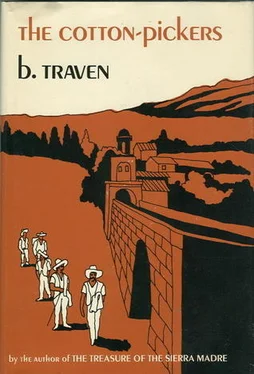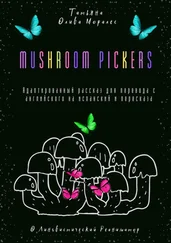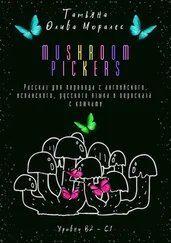B. Traven - The Cotton-Pickers
Здесь есть возможность читать онлайн «B. Traven - The Cotton-Pickers» весь текст электронной книги совершенно бесплатно (целиком полную версию без сокращений). В некоторых случаях можно слушать аудио, скачать через торрент в формате fb2 и присутствует краткое содержание. Год выпуска: 1969, Издательство: Hill and Wang, Жанр: Проза, на английском языке. Описание произведения, (предисловие) а так же отзывы посетителей доступны на портале библиотеки ЛибКат.
- Название:The Cotton-Pickers
- Автор:
- Издательство:Hill and Wang
- Жанр:
- Год:1969
- ISBN:нет данных
- Рейтинг книги:3 / 5. Голосов: 1
-
Избранное:Добавить в избранное
- Отзывы:
-
Ваша оценка:
- 60
- 1
- 2
- 3
- 4
- 5
The Cotton-Pickers: краткое содержание, описание и аннотация
Предлагаем к чтению аннотацию, описание, краткое содержание или предисловие (зависит от того, что написал сам автор книги «The Cotton-Pickers»). Если вы не нашли необходимую информацию о книге — напишите в комментариях, мы постараемся отыскать её.
—Book World
The Cotton-Pickers — читать онлайн бесплатно полную книгу (весь текст) целиком
Ниже представлен текст книги, разбитый по страницам. Система сохранения места последней прочитанной страницы, позволяет с удобством читать онлайн бесплатно книгу «The Cotton-Pickers», без необходимости каждый раз заново искать на чём Вы остановились. Поставьте закладку, и сможете в любой момент перейти на страницу, на которой закончили чтение.
Интервал:
Закладка:
“What’s the food like? Any good?”
“Well, it’s not too bad.”
“Mmmmm…”
“But you always get enough.”
“I know the stomach fillers only too well.”
Antonio laughed and nodded. He rolled himself a cigarette, offered me one which I didn’t take, and after a few puffs, he said: “Between ourselves, the food’s all right. The bakers and pastry cooks use eggs and sugar; it’s a real pleasure to handle the food. Understand, a dozen eggs here or there aren’t missed, and three eggs quickly broken into an odd cup and beaten up with some sugar helps the diet along. If you do this three or four times during the night, you feel fine.”
“What are the hours then?”
“They vary. Sometimes we start at ten at night and work until one, two, or three in the afternoon — sometimes until five.”
“That makes fifteen to nineteen hours a day then?”
“About that, but not always. Sometimes, generally on Tuesdays and Thursdays, we don’t start until twelve.”
“It’s not exactly tempting,” I said.
“But we might as well work there until we can find something better.”
“Of course,” I said. “If there were thirty-six hours in the day there’d be plenty of time to look around for something better. Ah well, I’ll give it a try.”
The thought that from now on I would be working with a murderer day and night, eating from the same pot, perhaps sleeping in the same room, this thought didn’t occur to me at once. Either I’d sunk so low morally that I’d lost all feeling for such niceties of civilization, or I’d moved so far ahead of my time and so far above the moral standards of the day that I understood every human action, and neither took upon myself
the right to condemn nor indulged in the cheap sentimentality of pity. For pity is also a condemnation, even if not so recognized, even if it is unconscious. Should I have felt a horror of Antonio, a revulsion against shaking his hand? There are so many thieves and murderers on the loose with diamonds on their fingers and big pearls in their neckties or gold stars on their epaulettes, and decent people think nothing of shaking hands with them, but even regard it an honor to do so. Every class has its thieves and murderers. Those of my class are hanged; others are invited to the president’s ball and complain about the crimes and immorality of workmen like me.
When you have to struggle hard to get a crust of bread, you find yourself down in the mire, floundering among the scum of humanity.
I felt the blood rushing to my head as these thoughts went round in my mind. Antonio suddenly brought me back to earth with the question: “Do you know who else is in town?”
“How should I know? I just got here last evening.”
“Sam Woe, the Chink.”
“What’s he doing here in Tampico?”
“You know he was always talking about the eating house he was going to open ―”
“You mean he opened one?”
“You bet he did. When a Chink like Sam Woe makes up his mind to do something, he does it. He runs his business with a fellow countryman.”
“You know, Antonio, you and I haven’t the flair for such things. I’m quite sure that if I were to open a restaurant, people would start being born without stomachs, just to make sure I didn’t get a break.”
Antonio laughed. “That’s my luck too. I’ve had a cigarette stall, a confectionery booth; I’ve lugged ice water around, and tried God knows what else. I hardly ever sold anything, and I went broke every time.”
“I think, Antonio, it’s because we can’t bring ourselves to downright swindling. And you have to know how to swindle if you want to be a success in business.”
“I suppose we should go and look up the Chink. He’d be pleased to see you too. I like to eat out now and then, for a change, you know. You can get sick of the same old grub where you work.”
So, we went off to the Yellow Quarter where the Chinese lived and had their shops and restaurants. Very few of them had businesses in other parts of the town. They liked to crowd together.
Sam was genuinely pleased to see me. He kept pressing my hand, laughing and prattling. He invited us to sit down, and we ordered a comida corrida.
Chinese eating houses are all much alike in this country. They have simple, square wooden tables, frequently not more than three of them, with three or four chairs to each. In view of the number of dishes you get, not more than three very good-natured customers can sit at one table at the same time. You can usually see what’s going on in the kitchen from where you sit. The nature and number of dishes is the same in all the Chinese places in town. That’s how they rule out unfair competition among themselves.
Sam had five tables. On each table stood a big-bellied, reddish-brown clay water jug of an ancient Aztec pattern. Then there was a glass bottle containing oil and another one with vinegar. In addition, there were a big bowl of sugar and several small bowls, one with salt, one with a reddish powdered pepper, and one with chile sauce. Half a teaspoon of the hot chile sauce in your soup is enough to make it absolutely unfit to eat.
Sam served the customers while his partner, with the help of a Mexican girl, looked after the cooking. First we were given a chunk of ice in a glass which we filled with water. Next, we got a large roll, there called a bolillo, and the soup followed. It’s always one variety of noodle soup or another. Antonio scattered a large soup-spoonful of green chile sauce into his soup, and I took two heaping ones. I’ve already said that half a teaspoon of this fiery sauce seasons the soup so highly that it’s impossible for a normal person to eat. But then, I’m not normal. While we were still dipping into our soup, the meat arrived, with fried potatoes, a dish of rice, a dish of beans. Now came a dish of stew. All the courses were put on the table at the same time.
Then, as usual, the swapping began. Antonio swapped his beans for tomato salad, which he prepared himself at the table, and I swapped my stew for an omelette.
Now Antonio put his rice into his soup; if he’d kept his beans he’d have put them in as well. Apparently he got enough beans at the bakery, but tomato salad was a treat.
I shook a layer of pepper onto my meat and another layer onto the fried potatoes. Then I seasoned the rice with chile sauce and sweetened the beans with sugar.
At the end of the meal we were each served a dulce — a sweet — and I had café con leche, that is, coffee with hot milk, but Antonio took only the hot milk.
Antonio and I exchanged small talk while eating. We didn’t want to spoil our digestion by taxing our brains with profundities.
For our meal we paid fifty centavos each, all included. It was the usual price in a Chinese restaurant, a café de chinos.
And now we sailed along to the bakery. I went into the pastry shop and asked a clerk if I could see the boss.
“Are you a baker?” the owner asked me.
“Yes, baker and pastry cook.”
“Where were you working last?”
“In Monterrey.”
“Good. You can start tonight. Free room, board, laundry, and I pay you one peso twenty-five a day. Wait a moment,” he added suddenly. “Are you good on cakes, cakes with fancy icing?”
“In my last job in Monterrey I did nothing but cakes with fancy icing.”
“Fine. But I’d better have a word with my master baker and hear what he says. He’s a first-class man. You can learn a lot from him.”
He took me into a dormitory, where the master was in the act of putting on his shoes, getting ready to go out.
“Here’s a baker from Monterrey who’s looking for work. See if he’s any use to you.” The boss went back to his office and left the two of us alone.
Читать дальшеИнтервал:
Закладка:
Похожие книги на «The Cotton-Pickers»
Представляем Вашему вниманию похожие книги на «The Cotton-Pickers» списком для выбора. Мы отобрали схожую по названию и смыслу литературу в надежде предоставить читателям больше вариантов отыскать новые, интересные, ещё непрочитанные произведения.
Обсуждение, отзывы о книге «The Cotton-Pickers» и просто собственные мнения читателей. Оставьте ваши комментарии, напишите, что Вы думаете о произведении, его смысле или главных героях. Укажите что конкретно понравилось, а что нет, и почему Вы так считаете.











